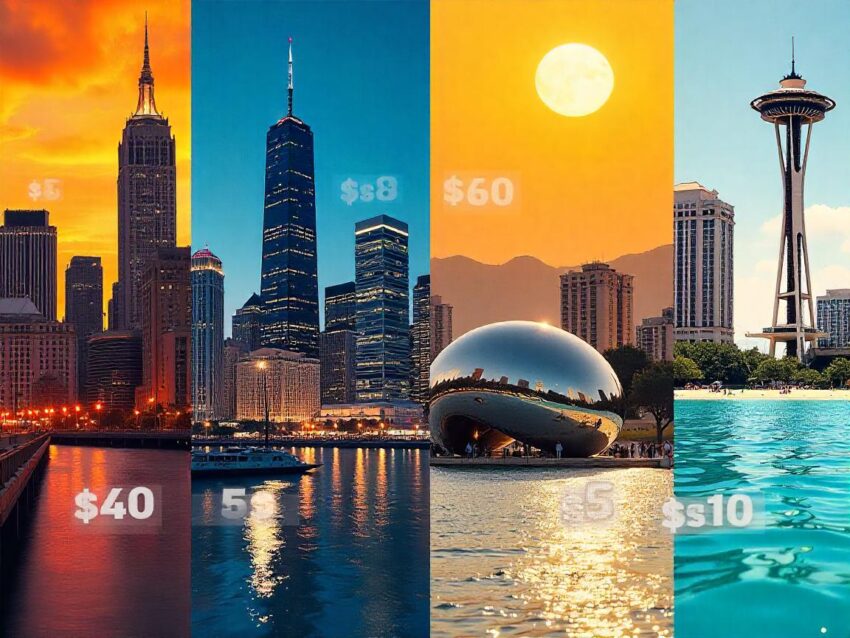New York City, Las Vegas, Chicago, San Francisco, Los Angeles, Miami: How Tourism Taxes Are Shaping Travel Across the United States, New Update for You

Sunday, July 13, 2025

From neon lights in Las Vegas to the towering skyline of New York Metropolis, America’s iconic locations promise unforgettable adventures. But beneath the glitter and glamour lies a quiet fact each traveler ought to know: tourism taxes are reshaping how we discover the nation—and the way a lot it prices. Cities like Chicago, San Francisco, Los Angeles, and Miami are leaning greater than ever on resort and lodging taxes to fund all the pieces from conference facilities to cultural preservation and even local weather initiatives.
For guests, these prices typically slip unnoticed onto ultimate payments, turning an reasonably priced getaway right into a pricier affair. However they’re additionally essential lifelines conserving cities vibrant and ready for the longer term. As tens of millions of vacationers plan their subsequent city escape, understanding these hidden prices has change into as important as packing a suitcase. On this new replace, we dive into how tourism taxes are reworking journey throughout America’s most beloved cities.
Image your self waking up in a modern New York Metropolis resort, the Empire State Constructing seen via your window. Or possibly you’re sipping mai tais on a balcony overlooking Waikiki’s surf. For tens of millions of vacationers, these are scenes of pure pleasure. But behind the glamour of U.S. journey lies a much less romantic actuality—one which hits your pockets earlier than you even unpack your baggage. Throughout America, tourism taxes are surging, reshaping each the price of journey and the way forward for the locations we love.
What Precisely Is a Tourism Tax?
In easy phrases, tourism taxes are prices added to your resort invoice or short-term rental keep. They go by many names: resort occupancy tax, lodging tax, mattress tax, transient occupancy tax—even “inexperienced charges” in some locations. For those who’ve ever seen your resort invoice balloon with mysterious add-ons, you’ve met the tourism tax.
In contrast to basic gross sales tax, tourism taxes are laser-focused on in a single day stays shorter than about 30 days. Whether or not you’re checking right into a luxurious resort, a modest motel, or an Airbnb, you’ll doubtless pay some type of this tax. These charges assist native governments fund all the pieces from advertising campaigns and tourism boards to conference facilities and even local weather change packages.
How A lot Are Vacationers Paying?
Vacationers throughout the USA face a patchwork of tax charges that modify wildly from state to state—and sometimes from metropolis to metropolis.
In Connecticut, you’ll pay the nation’s highest statewide resort tax of 15%, a hefty surcharge that may make even modest lodging a pricey affair. In the meantime, Hawaii’s well-known seashores include a few of the highest mixed charges within the nation. As of 2025, guests to the islands pay a 10.25% Transient Lodging Tax (TAT), plus a county surcharge that may carry the full to over 13.25%. And that’s earlier than factoring within the new climate-focused inexperienced charges poised to push whole lodging taxes to almost 18.7% in coming years.
New York Metropolis imposes a mixed 14.75% resort occupancy tax, plus a flat $3.50 price per evening. In Las Vegas, guests fork over roughly 13.38% of their nightly room price in taxes. Even in smaller markets, vacationers encounter charges starting from 5% to 12%, relying on what number of native districts add further charges for tourism promotion or conference heart funding.
The Billions Behind the Mattress Tax
Whereas these taxes may look like mere nuisances in your invoice, collectively they generate monumental sums for native economies. In 2023, state and native lodging taxes throughout the USA raked in roughly $52.4 billion, an enormous rebound from pandemic lows. For cities and states hit onerous by COVID-19 journey declines, this income has been an important lifeline.
Hawaii’s TAT alone accounted for over $800 million in 2023. Equally, tourism taxes in New York Metropolis assist fund native infrastructure, advertising, and public security measures that preserve the town buzzing for each residents and guests.
This income is essential. Many cities rely closely on guests to help native jobs, pay for cultural occasions, and preserve public areas. For instance, Las Vegas channels a good portion of its room tax earnings into selling the town’s conference enterprise—a significant financial driver past casinos.
Inexperienced Charges: A New Frontier in Tourism Taxation
Whereas conventional tourism taxes have lengthy been used for advertising and infrastructure, Hawaii is pioneering a distinct path. In 2025, the state handed new laws making a climate-focused inexperienced price—a surcharge of roughly 0.75% added to lodging payments, alongside an 11% price for cruise ship passengers docking in Hawaiian ports. The funds are earmarked for environmental preservation, combating seaside erosion, wildfire safety, and different local weather resilience tasks.
This daring transfer might function a template for different tourist-heavy areas grappling with the twin pressures of rising customer numbers and environmental pressure. With Hawaii’s annual customer tally approaching 10 million, the potential for sustainable funding is critical. Officers estimate the inexperienced charges might usher in $100 million yearly, signaling a shift in how states may finance environmental safety with out inserting extra tax burdens on native residents.
The Airbnb Impact: How Quick-Time period Leases Are Altering the Tax Recreation
It’s not simply motels that should navigate the labyrinth of tourism taxes. The explosion of short-term leases via platforms like Airbnb and Vrbo has compelled native governments to rethink tax assortment.
In lots of states, these platforms at the moment are required to gather and remit lodging taxes on behalf of hosts, leveling the taking part in area with motels. In some locations, like Hawaii and New York Metropolis, enforcement has tightened to make sure even informal rental hosts contribute to native tax coffers.
Nonetheless, the foundations fluctuate extensively. In Texas, for instance, Airbnb collects the state’s 6% resort occupancy tax, however native taxes should be the host’s duty until agreements exist with every metropolis. This complicated patchwork typically confuses each vacationers and hosts, contributing to disputes and compliance challenges.
Hidden Prices for Vacationers—and Hidden Advantages for Locations
For vacationers, tourism taxes can typically really feel like hidden charges, quietly inflating the price of a trip. A resort room marketed at $250 per evening may in the end price over $280 as soon as taxes and charges are added—a distinction that may considerably influence budget-conscious guests.
But these similar taxes typically fund the very issues that make locations value visiting. They pay for seaside upkeep in coastal cities, public transportation enhancements in cities, and advertising campaigns that preserve tourism economies thriving. In essence, vacationers are investing within the locations they love, serving to guarantee they continue to be vibrant and sustainable.
Hawaii’s inexperienced charges, as an illustration, might change into a vital software in preserving the state’s delicate ecosystems, defending coral reefs, and making certain future generations can get pleasure from the identical pure magnificence vacationers expertise at present.
For tens of millions of vacationers annually, the fun of exploring America’s iconic cities comes with an sudden price ticket lurking beneath the floor: tourism taxes. Whether or not you’re checking right into a luxurious high-rise in New York Metropolis or an elegant boutique resort in San Francisco, there’s one factor you’ll be able to depend on — your ultimate invoice shall be larger than marketed. But behind these charges lies an interesting story of how cities fund tourism, tradition, and typically even social companies. Right here’s an inside have a look at how main U.S. locations are shaping vacationers’ wallets — and their very own futures.
New York Metropolis: The Metropolis That By no means Sleeps… on Taxes
It’s no secret that New York Metropolis is without doubt one of the most costly locations to go to on the earth — and its resort taxes don’t make it any cheaper. Vacationers staying in Manhattan motels pay a whopping 14.75% resort occupancy tax on prime of their room price. Plus, there’s a flat $3.50 per evening price per room, which could appear small however rapidly provides up for longer stays.
These taxes gas important metropolis initiatives, from tourism promotion to sustaining cultural establishments that draw guests from across the globe. New York Metropolis relies upon closely on tourism as an financial engine, and these funds assist preserve the subway operating, museums open, and public areas vibrant. Nonetheless, vacationers typically discover themselves shocked when a $250 nightly price balloons to almost $300 after taxes and charges.
Las Vegas: Betting on Tourism Income
Las Vegas is the final word metropolis of neon lights, blackjack tables, and lavish exhibits. But behind the glitz lies one of many nation’s highest resort tax charges — round 13.38%. Vacationers flocking to the Strip contribute tens of millions to Clark County’s coffers yearly.
However in Las Vegas, these taxes serve a definite function. The income funds the Las Vegas Conference and Guests Authority, which markets the town globally and helps safe main conventions and occasions. That’s why Vegas can host all the pieces from CES to world-class boxing matches. For guests, it’s a trade-off: they pay extra to remain, however the result’s a metropolis that by no means stops entertaining.
Chicago: The Windy Metropolis’s Monetary Gust
Chicago could also be identified for deep-dish pizza and architectural marvels, however it additionally holds the excellence of one of many highest mixed resort tax charges within the nation — 17.4%. This contains state, metropolis, and county parts, all added onto your nightly invoice.
For the town, these taxes are essential. They help native tourism efforts, fund conference operations at McCormick Place, and assist preserve Chicago’s world-famous cultural establishments. The price may sting, however for a lot of vacationers, the prospect to walk alongside the Magnificent Mile or go to the Artwork Institute makes it worthwhile. Nonetheless, finances vacationers ought to consider that further 17% earlier than reserving their keep.
San Francisco: Funding the Metropolis by the Bay
San Francisco’s picturesque hills and well-known bridges lure guests from all over the world — and so do its resort taxes. The town prices a 14% resort tax, with extra district charges that modify relying on the place you keep.
What’s distinctive about San Francisco is how voters have more and more pushed to dedicate resort tax revenues towards particular social targets. Measures have directed parts of those funds to homelessness companies, arts and cultural packages, and reasonably priced housing initiatives. For vacationers, it means paying extra to remain, but additionally figuring out their cash helps help essential metropolis wants.
Los Angeles: Tinseltown’s Tax Take
Whether or not you’re chasing Hollywood desires or seaside sunsets, a go to to Los Angeles comes with a 14% resort tax. These revenues assist fund tourism promotion, metropolis companies, and occasions that draw world consideration.
The tax burden is critical, however Los Angeles leverages its various sights — from movie studios to iconic seashores — to maintain guests flowing in. Nonetheless, vacationers on a finances ought to look ahead to these further prices, particularly when staying close to hotspots like Hollywood or Santa Monica.
Miami: Solar, Sand, and Surcharges
Miami’s glittering skyline and white sand seashores are a magnet for vacationers in search of solar and Latin-inspired nightlife. However these tropical vibes include a value. Lodge taxes in Miami-Dade County vary from 6% to 7%, relying on which metropolis you keep in.
These funds help essential tasks like seaside renourishment, conference heart expansions, and tourism advertising. Given Miami’s vulnerability to local weather change, a few of these revenues additionally assist fund resilience tasks to guard the coast from rising seas. For vacationers, it’s a reminder that paradise all the time comes with hidden prices.
Boston: Historical past Comes with a Surcharge
In Boston, historical past is alive on each nook — from the Freedom Path to cobblestoned streets. However exploring it means navigating a posh tax panorama. Massachusetts levies a 5.7% state resort tax, and Boston provides as much as 6.5% domestically, totaling over 12% in some neighborhoods.
This income fuels tourism advertising, infrastructure upkeep, and metropolis companies. Boston’s management sees it as a strategy to protect its historic websites and preserve the town engaging for guests year-round. For vacationers planning to remain close to Boston Frequent or the harbor, it’s clever to incorporate these further percentages within the finances.
Orlando: The Magic Comes at a Value
Orlando may be synonymous with theme parks, however it’s additionally identified for its 6% Vacationer Growth Tax, collected on motels and short-term leases. The tax income is used to develop the Orange County Conference Middle, fund sports activities amenities, and market the area globally.
Given the flood of vacationers visiting Walt Disney World, Common Orlando, and numerous different sights, this tax generates vital income. It’s a part of why Orlando stays one of many world’s prime journey locations, even when it provides a bit extra to the nightly resort price.
Seattle: Rain and Income
Seattle’s skyline, espresso tradition, and proximity to nature make it a beloved cease for vacationers. Nonetheless, resort stays within the Emerald Metropolis include mixed taxes reaching as much as 15.6%. The town makes use of the income to help tourism promotion, conference facilities, and concrete growth tasks.
For vacationers, it’s the value of experiencing Pike Place Market, the Area Needle, and people iconic mountain views. The prices can sneak up on guests reserving fashionable motels in downtown neighborhoods, so consciousness is essential.
Honolulu: Paradise Priced Greater
Hawaii’s attract is simple — turquoise seas, lush mountains, and aloha spirit. But paradise comes with a steep price ticket. Honolulu resort visitors pay a 10.25% Transient Lodging Tax, plus as much as a 3% county surcharge. And that’s earlier than contemplating Hawaii’s new inexperienced price initiatives, which might push whole lodging taxes towards 18.7% in coming years.
The brand new climate-focused charges intention to fund coastal safety, wildfire prevention, and environmental preservation. Hawaii’s mannequin indicators a pattern: tourism taxes more and more fund not simply advertising and infrastructure but additionally sustainability efforts. For vacationers, it means larger prices however the information that their spending contributes to defending Hawaii’s fragile ecosystems.
Why Vacationers Ought to Pay Consideration
Tourism taxes may look like small line objects, however throughout the U.S., they’re vital income streams for cities and states. They fund important companies, preserve cities vibrant, and more and more help sustainability tasks. But for vacationers, they signify an often-overlooked a part of the finances that may flip an reasonably priced getaway right into a pricier affair.
Savvy vacationers ought to all the time test the high quality print earlier than reserving. Lodge web sites typically promote base charges, leaving taxes as a shock. Platforms like Airbnb now gather these taxes in lots of areas, leveling the taking part in area however nonetheless including price.
In the end, tourism taxes are the value we pay to assist preserve our favourite locations thriving. The following time you admire the neon lights of Vegas, the waves crashing in Waikiki, or the skyline of Manhattan, bear in mind: a couple of {dollars} extra every evening may be serving to these cities keep extraordinary for years to come back.
Future Developments: Goal-Pushed Tourism Taxes
The way forward for U.S. tourism taxes seems more and more purpose-driven. Moderately than merely elevating income, new insurance policies intention to align tourism spending with sustainability and group advantages. Hawaii’s inexperienced price is only one instance.
Cities like San Francisco have mentioned utilizing resort tax income to deal with homelessness. In Colorado, sure native lodging taxes fund reasonably priced housing initiatives to assist offset tourism’s influence on native housing markets. Throughout the nation, tourism taxes are evolving into strategic instruments, not simply income streams.
Vacationers, too, are shifting their attitudes. Many now specific willingness to pay further in the event that they know their {dollars} help environmental preservation or group packages. The problem for governments shall be making certain transparency and demonstrating that taxes certainly fund the promised enhancements.
Navigating Your Subsequent U.S. Journey
Because the journey panorama evolves, vacationers should change into savvy in regards to the hidden prices baked into lodging costs. Earlier than reserving, it’s clever to:
- Test resort web sites for whole “all-in” costs, together with taxes and charges.
- Analysis native lodging taxes in your chosen vacation spot.
- Perceive that short-term leases are sometimes taxed equally to motels.
The underside line? Whether or not you’re jetting off to Manhattan’s vibrant lights or Hawaii’s quiet seashores, tourism taxes at the moment are a part of the fashionable journey equation. They’re reshaping how locations fund their futures—and the way vacationers plan their dream getaways.
One factor is for certain: on the earth of U.S. journey, the value of paradise comes with high quality print. And the following time you see these further charges in your invoice, you’ll know precisely the place they’re going—and why.
2025-07-12 22:44:00






